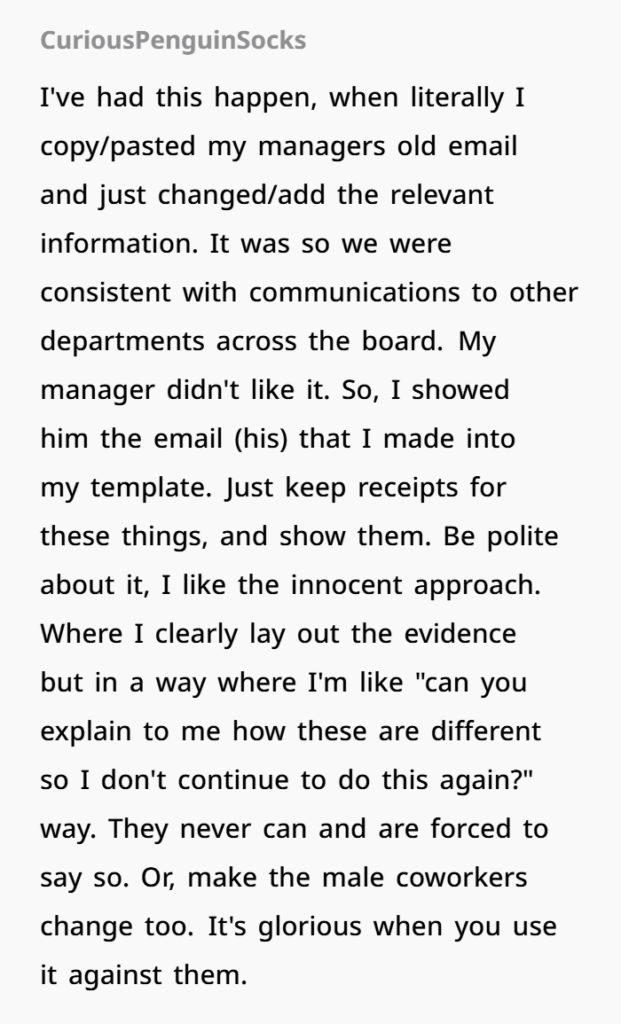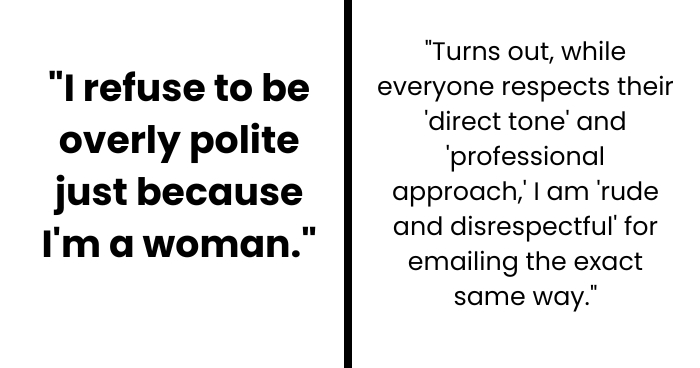Woman Adopts Men’s Email Style, Faces Backlash for Being ‘Rude’
A late 20-something female corporate worker who posted as the OP (original post), decided to change her emailing approach to match the direct and somewhat brusque style of her male colleagues. Before, her tone was much more casual and conciliatory, with lots of salutations, exclamation points and emojis. Worried this would compromise her professionalism, she opted for the shorthand, no bullshit approach her male co-workers use.
But when she switched to this tone, she was accused of being “impolite and disrespectful”—in a direct and kind tone which her male co-workers also used, were considered more professional and straight shooters. She included, to illustrate the inconsistency, a line copied verbatim from a male colleague, and still got called on its tone. She compared the emails side by side and, based on his reaction to seeing them, her manager was embarrassed, which indicated the roadblock of implicit bias. Although the company was big on gender equality, their double standard showed through in this particular incident. OP refuses to be put back in his & our place re: antiquated gender norms, but they are getting backlash.
Read for more info Reddit






The Gendered Expectations of Workplace Communication
What OP has experienced is a classic case of gendered communication discrimination in the corporate arena. Research consistently finds that women’s language is expected to be padded with pleasantries, exclamation points and apologies in order to be seen as likable and friendly, whereas males are afforded more freedom to be straightforward without social consequences.
The Double Standard in Workplace Communication
Studies conducted by Dr. Judith Baxter, a linguist specializing in gender and workplace discourse, show that women leaders using direct and assertive language are 70% more likely to be labeled as “abrasive” or “bossy” compared to men using the same language. In-men using the same style are seen as assertive and capable.
One famous study published in the Harvard Business Review also determined that when men negotiate with strength, they were rewarded with positive feedback; but when women engage in the same behavior, they are often labeled as “difficult” or “aggressive.” This goes beyond the negotiation table into all aspects of communication—emails, meetings, performance reviews.
Bias in Email Communication
A 2021 study in the Journal of Business and Technical Communication found that women who removed hedging language (e.g., “just checking in” or “I was wondering if”) were 1.5 times more likely to receive negative feedback on their tone than men who wrote similarly. This suggests that the expectation for women to soften their language is deeply ingrained, even when companies claim to support gender equality.
Why Does This Happen?
- Social Conditioning: Women are often socialized from a young age to prioritize harmony and likability in interactions, whereas men are encouraged to be assertive and direct.
- Unconscious Bias: Even well-intentioned managers may subconsciously expect women to conform to different communication standards.
- Workplace Norms: Corporate cultures historically built around male-dominated structures still carry implicit biases in language expectations.
Standing Firm and Pushing for Change
OP’s refusal to revert to overly polite language is a bold stand against these outdated norms. However, pushing for systemic change requires more than just individual resistance. If OP wants to address this issue beyond personal choices, here are some strategies:
- Bring Awareness to Bias: Sharing studies and examples with leadership (like how her manager reacted) can make a difference. Many people don’t realize these biases exist until they see them firsthand.
- Encourage Consistency in Feedback: If direct emails are deemed “rude” for women but not for men, managers should be encouraged to standardize their expectations across all employees.
- Advocate for Workplace Training: Companies serious about inclusion should implement bias training to help employees and managers recognize and correct these double standards.









OP’s experience highlights a frustrating but common workplace issue. While the backlash she faced is unfair, her decision to stand her ground is commendable. As workplaces strive for true equality, addressing communication biases is a crucial step. The more these issues are exposed, the harder they are to ignore.


